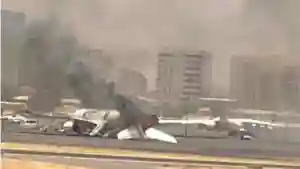Zimbabweans who were living and working in Sudan have recounted their experiences following serious fighting involving the army and a paramilitary group in and around Khartoum.
Zimbabwe’s ambassador to Sudan, Mr Emmanuel Runganga Gumbo, arranged for transport to take the evacuees from the capital to Port Sudan, escorted by a team from the United Nations.
One evacuee, Mr Watson Nyakutira, reported that the journey to the port took more than 25 hours and was both arduous and risky. He told The Sunday Mail:
We travelled a long way from Khartoum to Port Sudan. It took us around 25 hours. It took us another 36 hours on this ship from Port Sudan to Jeddah (Saudi Arabia), a nearly 900km journey through the sea.
We remain grateful to the President through his Ambassador, Emmanuel Runganga Gumbo, for the swift action he took to make sure we were safe. If it wasn’t for them, we would have been there or dead at most. When the United Nations came to escort people, the ambassador quickly organised a bus that joined the convoy and ferried us to the port.
Mr Nyakutira was part of the first group of 42 Zimbabwean nationals who returned home on Friday after being evacuated from Sudan due to ongoing conflict. The second group of 21 evacuees is expected to arrive tomorrow. The group includes teachers and staff members from the Zimbabwean Embassy in Khartoum.
Ms Pauline Hungwe, a teacher in Khartoum, experienced the sound of gunfire and bombings for the first time in her life when conflict erupted in the capital on April 15. She said stray bullets were visible shelling through walls, and she feared for her life. After a week of fighting, things worsened as dead bodies were scattered around the city. Ms Hungwe expressed concern about the traumatic experience for children who witnessed the violence.
Mrs Brenda Mutandwa-Chiswa, a teacher, and her husband were in Riyad, a suburb close to the fighting in Khartoum when the conflict erupted. They described heavy bombings, fighter jets flying over their homes, and continuous gunfire. Food became a luxury, and they had to go for extended periods without water and electricity. Mr Sydney Chiswa expressed fear and concern about skyrocketing prices and the scarcity of water due to the violence. Mrs Mutandwa-Chiswa is still traumatised by the experience.
Ambassador Emmanuel Runganga Gumbo stated that they took advantage of a temporary ceasefire to evacuate Zimbabwean nationals. He mobilized logistics to move to the relatively safe Port Sudan, and the Zimbabwean nationals had to make their way to the embassy by 5:30 am on Sunday morning. A bus then took them to the United Nations offices to join the convoy, and all were successfully evacuated without anyone being left behind. Ambassador Gumbo has also returned home.
Fighting broke out in Khartoum in mid-April between the Sudanese army under General Abdel Fattah al-Burhan, who is considered the country’s de facto ruler, and a paramilitary group, Rapid Support Forces (RSF), led by General Mohamed Hamdan Dagalo.

